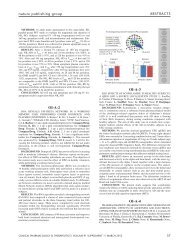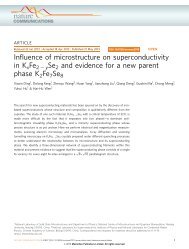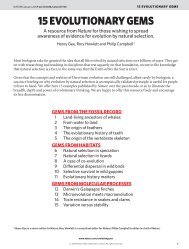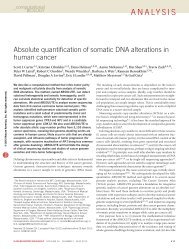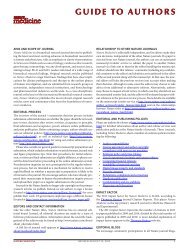open access: Nature Reviews: Key Advances in Medicine
open access: Nature Reviews: Key Advances in Medicine
open access: Nature Reviews: Key Advances in Medicine
You also want an ePaper? Increase the reach of your titles
YUMPU automatically turns print PDFs into web optimized ePapers that Google loves.
ENDOCRINOLOGY<br />
THYROID DISEASE IN PREGNANCY IN 2011<br />
Thyroid function—effects on mother<br />
and baby unraveled<br />
Anthony P. Weetman<br />
The complex relationship between pregnancy and thyroid function, and its cl<strong>in</strong>ical effect on mother and baby,<br />
cont<strong>in</strong>ued to stimulate research <strong>in</strong> 2011. <strong>Key</strong> advances were made on three important issues: how long<br />
maternal thyroid function affects fetal thyroid hormone levels; whether thyroid autoimmunity affects pregnancy<br />
outcome; and the prevalence of permanent hypothyroidism after postpartum thyroiditis.<br />
Weetman, A. P. Nat. Rev. Endocr<strong>in</strong>ol. 8, 69–70 (2012); published onl<strong>in</strong>e 6 December 2011; doi:10.1038/nrendo.2011.217<br />
The fetal thyroid gland starts to develop at<br />
12 weeks of gestation, and for the first half of<br />
pregnancy, transplacental passage of maternal<br />
thyroid hormone is essential for normal<br />
fetal development. Failure to deliver sufficient<br />
thyroid hormone to the fetus causes impaired<br />
neurological development, although whether<br />
other elements of fetal development are also<br />
affected rema<strong>in</strong>s unclear. The essentially<br />
normal outcome <strong>in</strong> neonates with congenital<br />
hypothyroidism promptly treated with levothyrox<strong>in</strong>e<br />
after birth suggests that maternal<br />
thyroid hormones also have a fetal role <strong>in</strong> the<br />
second half of pregnancy.<br />
In a prospective survey of 886 pregnant<br />
Dutch women published <strong>in</strong> 2011, neonates<br />
born to mothers who had high-normal TSH<br />
levels (above the 97.5 th percentile) one or<br />
more times dur<strong>in</strong>g pregnancy had lower<br />
total T 4 levels when rout<strong>in</strong>e screen<strong>in</strong>g was<br />
performed for congenital hypothyroidism<br />
than neonates born to mothers whose TSH<br />
levels had rema<strong>in</strong>ed below the 97.5 th percentile.<br />
1 This result contrasts with that of a<br />
previous study that showed no relationship<br />
between maternal and neonatal thyroid function,<br />
2 a difference possibly related to the use<br />
of pregnancy-specific refer ence ranges for<br />
TSH measurement <strong>in</strong> the 2011 study.<br />
Although the women with high-normal<br />
TSH levels had normal free T 4 levels, the TSH<br />
levels might reflect a resett<strong>in</strong>g of the<br />
pituitary–thyroid axis, which resulted <strong>in</strong><br />
less T 4 be<strong>in</strong>g available to cross the placenta.<br />
Alternatively, an unsuspected <strong>in</strong>crease <strong>in</strong><br />
placental deiod<strong>in</strong>ase activity might have<br />
been responsible for low T 4 availability to<br />
the fetus. Low gestational age was associated<br />
with low neonatal thyrox<strong>in</strong>e levels <strong>in</strong><br />
this and previous studies, which raises the<br />
possibility that maternal thyroid function<br />
throughout pregnancy, rather than just the<br />
first trimester, is an important determ<strong>in</strong>ant<br />
of gestational outcome. Detailed sampl<strong>in</strong>g of<br />
maternal thyroid function is required to<br />
<strong>in</strong>vestigate this hypo thesis further.<br />
In a related study from 2011, maternal thyroid<br />
function variables measured at 28 weeks<br />
gestation were compared with those measured<br />
<strong>in</strong> the umbilical cord at birth <strong>in</strong> 616<br />
preg nancies <strong>in</strong> the UK. 3 Maternal free T 4 and<br />
cord free T 4 values showed a positive correlation,<br />
and maternal TSH levels were <strong>in</strong>versely<br />
corre lated with cord free T 4 levels. This evidence<br />
by Shields and co-<strong>in</strong>vestigators is consistent<br />
with that of the Dutch study 1 and<br />
sug gests that maternal thyroid function has<br />
a measurable effect on fetal thyroid hormone<br />
levels throughout pregnancy.<br />
Shields et al. also exam<strong>in</strong>ed the effect of<br />
thyroid hormone levels on various parameters<br />
of fetal growth. Cord free T 4 levels<br />
were associated with birth weight, length and<br />
sk<strong>in</strong>-fold thickness. These results imply that<br />
fetal thyroid hormone levels have an important<br />
role <strong>in</strong> regulat<strong>in</strong>g fetal growth, especially<br />
when taken <strong>in</strong> conjunction with the results<br />
of animal experiments. 4 An unexpla<strong>in</strong>ed<br />
f<strong>in</strong>d<strong>in</strong>g was that birth weight was negatively<br />
associated with maternal free T 4 levels, given<br />
that maternal and cord free T 4 levels were<br />
positively associated.<br />
Together, these two studies highlight the<br />
<strong>in</strong>tricacy of the maternal–fetal relationship<br />
with regard to thyroid function and its cl<strong>in</strong>ically<br />
important effects on fetal growth and<br />
ges tational age. Studies with detailed assessment<br />
of maternal thyroid function throughout<br />
the third trimester that <strong>in</strong>corpo rate<br />
assess ment of placental deiod<strong>in</strong>ase activity<br />
are needed. Variable iod<strong>in</strong>e <strong>in</strong>take is also a<br />
con found<strong>in</strong>g factor that needs address<strong>in</strong>g,<br />
given the surpris<strong>in</strong>g discovery <strong>in</strong> 2011 of<br />
<strong>in</strong>ade quate dietary supplies <strong>in</strong> the UK and<br />
<strong>in</strong> other countries. 5<br />
Multiple studies have shown that euthyroid<br />
pregnant woman with positive thyroid peroxidase<br />
(TPO) antibodies have an <strong>in</strong>creased<br />
risk of spontaneous mis carriage and possibly<br />
preterm delivery. Two mechanisms might be<br />
responsible. Firstly, even though ‘euthyroid’,<br />
these women may have subtle impairment<br />
of thyroid function, and the effects of maternal<br />
thyroid function on the fetus, as discussed<br />
above, are responsible. Secondly, thyroid<br />
auto immunity dis torts the immunological<br />
balance required to ma<strong>in</strong>ta<strong>in</strong> tolerance to<br />
the fetal semi-allograft. 6<br />
In 2011, a study of 245 TPO-antibodypositive<br />
women with TSH levels




